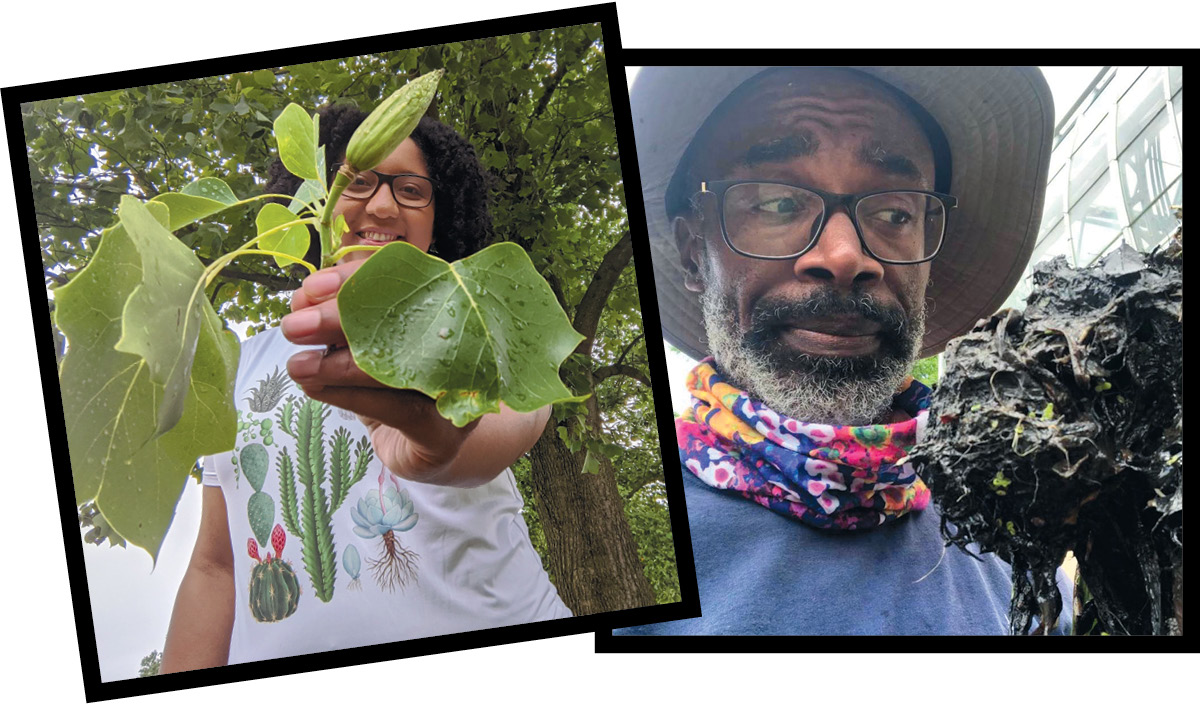Reflections and Reclamation

Images from the first Black Botanists Week, tagged as such on Instagram. PHOTOS (from left) Dr. Tanisha M. Williams/@t_marie_wms and U.S. Botanic Garden/@usbotanicgarden
I have spent much of my career as a plant biochemist in academia as a first and only. I was the only Black graduate student in my doctoral class, the first Black postdoctoral scientist in my department, and the first and only Black professor in my unit. Nearly two decades later, I’m still the only Black woman professor among the tenure-system rank in my college.
My mom might have been the first professor in our family. She loved math and is still quick with numbers. Yet, she and my father grew up in the segregated South, a mere few generations removed from our ancestral family who had been enslaved. Though my parents were born post-emancipation, their freedom had severe limitations. Their already “separate and unequal” education was also routinely interrupted — they were unable to regularly go to school during cotton harvest season. During these times, they had to serve as farm labor alongside their parents.
As a child, I watched my mom lovingly care for a home filled with plants of all kinds: flowering plants, vining greenery that climbed and spiraled around decorative columns and over doorposts, even the occasional fern or succulent. Perhaps because of her forced care for plants in her youth, she never pushed when my siblings and I showed little interest in emulating her exemplary plant caretaking skills. Yet, when my own path to a career as a biologist branched into a focus on plants, I realized that my mom was one of the first and only Black botanists I knew personally.
Although I may be the first formally educated botanist in the family, I am certainly not a first-generation Black botanist. With her keen ability to “listen” to her plants, to identify and respond to their needs, my mom was certainly a botanist before me. And given the many botanists who were certainly among my enslaved
ancestors, I’m not likely a second-generation Black botanist either. Among them were those whose expertise in cultivating rice and other crops led to them being highly valued as property, even as their enslavement was an abhorrent moral devaluation. Reflection on this reality reminds me my success is a reclamation of sorts of our ancestral botanical legacy.

PHOTOS (from left) NC State University CALS/@ncstatecals and Janae Dedrick/@luvvyn_tilinfiniti
This broad understanding of how Black botanical knowledge grew outside of formal educational spaces was one of the motivating factors for me and eleven other founding members of Black Botanists Week (including Dr. Tanisha M. Williams, top left) to define “botanist” broadly. The first Black Botanists Week — a social media movement tied by eponymous Instagram, Facebook and Twitter accounts as well as the #BlackBotanistsWeek hashtag — took place from July 6 to 12, 2020.
Black Botanists Week … allowed all of us to see that though we may be alone in our local community, we are not alone.
It followed and was inspired by Black Birders Week, which was initiated to demonstrate the challenges Black individuals face in natural spaces due to ongoing and persistent racism. These weeks proceeded in solidarity with Christian Cooper, a Black birder who encountered racism and hostility from a white woman in New York City’s Central Park. Both weeks were carried out to build community and support, as well as to highlight Black representation in scientific and natural spaces.
Black Botanists Week served as a powerful platform to cultivate a community of critical mass for those of us often isolated in our spaces. It allowed all of us to see that though we may be alone in our local community, we are not alone. The importance of representation, and seeing the possibility that fully embodies one’s own identity and existence, is true across human demographics.
Fortunately, digital spaces serve powerfully to counteract physical isolation and connect us across the globe. Certainly the messages that we received from Black people who love plants, describing the personal power and impact of seeing like others, reverberated across the digital threads connecting us. We experienced firsthand that plants and our engagement with them hold great power to stimulate our own growth — growth in our joy of caring for plants, but also in cultivating solidarity with others who share our background and interests.
Dr. Beronda Montgomery is a writer, professor at Michigan State University, and science communicator. Her research focuses on how organisms (primarily plants) maintain a sense of self and what behaviors they should pursue to support their success. She is the author of “Lessons from Plants,” published in 2021 by Harvard University Press. Learn more at berondamontgomery.com.
